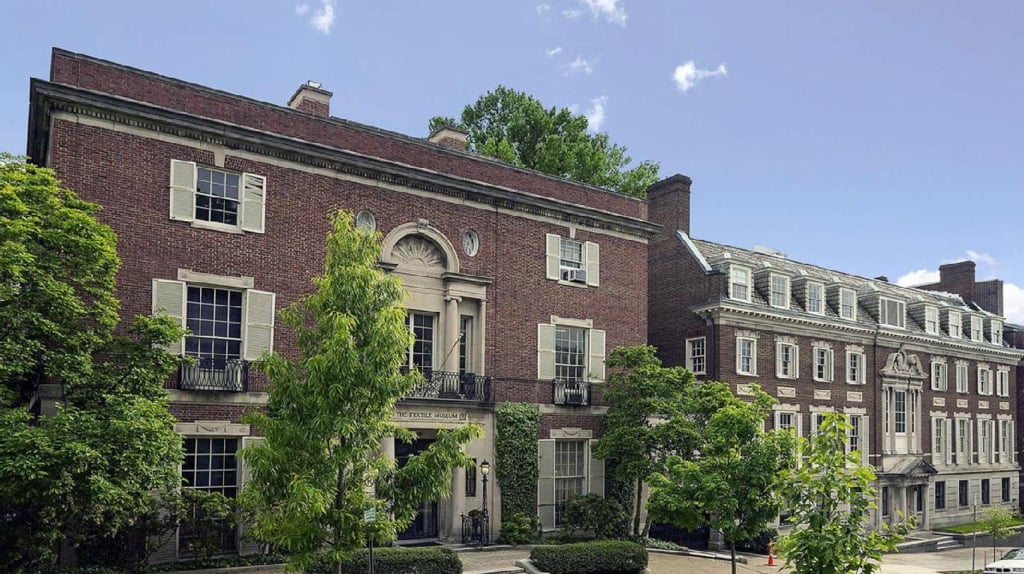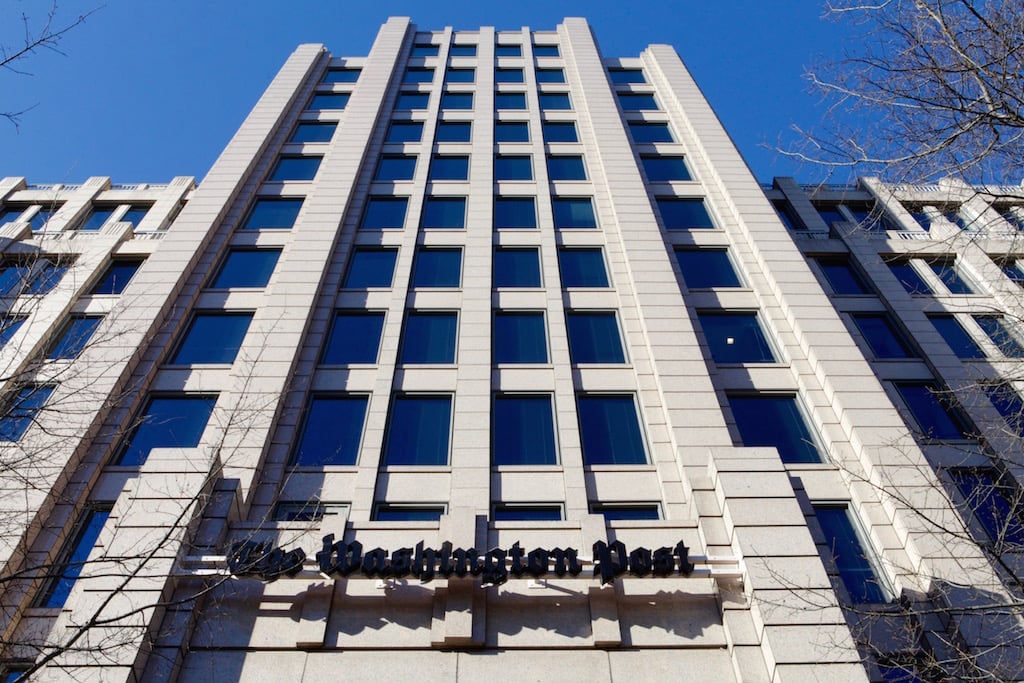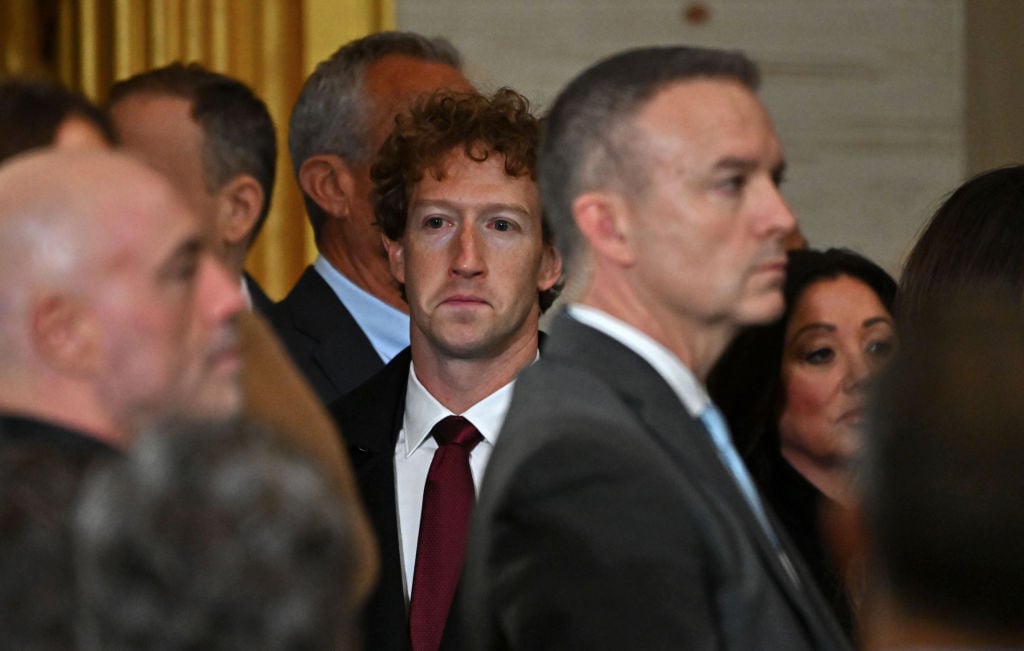When Jeff Bezos had purchased a vast Kalorama property and set about remodeling it to accommodate throngs of partygoers, social Washington began speculating that the Amazon founder and Washington Post owner was angling to revive Katharine Graham‘s role as the capital’s premier host.
Now we have a chance to see what that looks like: The Amazon Embassy, as Bezos’s digs have been called, is open for business.
This past weekend, chez Bezos hosted its first large-scale soiree. The party, convened after the heavily-ritualized Alfalfa Club banquet, attracted a few dozen guests that cut a broad swath of occupations and politics—financiers Jamie Dimon and David Rubenstein; tech machers Bill Gates and Steven and Jean Case; White House advisers Jared Kushner, Ivanka Trump and Kellyanne Conway; Republican senator Mitt Romney and his guest, Ben Stiller; and the upper ranks of the Washington press corps, including Nora O’Donnell, Jonathan Karl, and Washington Post publisher Fred Ryan.
For some guests, the draw of the long-anticipated arrival was its own mythos. “It was more kind of star-gazing than anything,” said one guest describing the mood. “Folks weren’t genuflecting. It was: Yeah, let’s go check this place out. How does this guy spend this much money?”
Partygoers painted a picture of a swank-filled evening in close quarters, where they gathered in the Pope House, the part of the property intended for residential use. (The other wing, the space actually designed for entertaining, was still awaiting permits as of January 16.)
No elaborate toasts or exuberant welcomes were on offer from Bezos or his partner, Lauren Sanchez. One attendee described the decor as “very theatrical” and reminiscent of the Inn at Little Washington. Bill Gates held forth in the lounge on tax policy with a clutch of listeners, while elsewhere, guests reckoned with another prevailing topic of the evening: “Everybody’s sitting there going like, He’s up to something!” said an attendee. “He’s got a plan! What’s he doing?” (A spokesperson for Bezos did not comment.)
The weekend formalized a Bezos landfall that, according to documents, quietly happened weeks ago.
Ever since 2016, when an anonymous buyer purchased the Textile Museum, the titanic renovation project has marked the future DC residence of the Seattle-based CEO. At nearly $40 million in total cost, the barn-raising showcased much of the billionaire’s approach: Brash, big, and—this being Amazon—delivered on a tight timeframe. In the waning months of fall, the curbside at 2320-2330 S Street came to resemble a Red Cross relief zone, with idling trucks, bustling landscapers and, occasionally, visits from the boss himself. (Bezos checked on the progress of the renovations at least four times last year, say sources involved in the project, and may have even stayed over for a night after being honored at the National Portrait Gallery’s biannual gala.)
The end date for the project was originally slated for August 2019, according to architectural plans. But the renovations have encountered months of delays. While the Pope House has been approved, the Wood House, the adjacent dwelling intended to host larger social fare, remains unfinished for final approval. “Mr. Bezos wanted it done, like, yesterday,” said a person involved with the renovation plans, who said “it was a rushed ‘Let’s get it done, let’s get it done now’ ” atmosphere.
Hidden in the project’s final stages, then, lay a very Bezos touch. With the 2019 timeframe in mind, and the Alfalfa gathering looming, a flurry of paperwork finalized the approval of the Pope House—each stamped before midnight on December 31, 2019. Bezos, it must be said, is nothing if not “customer obsessed.”
In recent months, the mogul’s arrival has surpassed the typical gossip for celebrity housewarmings, taking on the kind of collective fuss better suited to a coronation. The response, however overwrought it may be, is not unfounded. People close to Bezos have long said that the world’s richest man is erecting more than just a new home address in Washington—assembling a personal launchpad to accompany his ownership of the region’s leading newspaper, the lobbying arm of his rocket company, and the soon-to-be second headquarters of his company. To do that, Bezos has spent the past few years increasing his visits to Washington, and has privately laid out a distinct vision for how his Kalorama home might be used.
“What he’s going to do is revive the legacy of Kay Graham and her great socializing—bringing smart, interesting people together in a social context,” said Jean Case back in 2018, referring to the late Washington Post publisher, and who has been friends (along with husband and AOL founder Steve Case) with Bezos for decades. She described Bezos’s intentions from the start as creating “a magnet of smart, interesting people from all walks.”
Adapting to life as a doyen of Washington intelligentsia was far from certain, and would require recasting the man who once bailed on a fundraiser for then-candidate Bill Clinton in order to play volleyball with colleagues. But Bezos’s vision of the future became far more plausible last weekend, as liberals and conservatives mingled alongside burnished members of the power set in tech, finance and government. The wisdom of Bezos’s investments could arguably not have found better timing: one week after a blockbuster report implicated Saudi Arabia in a personal hacking scheme, and widened the scope of questions dogging American Media executive David Pecker and, by extension, President Donald Trump.
Beyond whatever boost Bezos’s presence might afford his personal aims—and the boost could be considerable—his arrival draws on other energies that channel the city’s prospects. In some ways, Bezos’s massive Kalorama residence is a bauble of the new Washington: less company town, more diversified tech hub; less of a waystation, more of a destination; less Hollywood for ugly people, more Hollywood; and a reprise of an era of policymaking that thrums with larger-than-life personalities, in a capital whose tone has been set by two presidents largely allergic to the ritualized gladhanding of Washington.
There are, of course, people who forecast the dangers of the coming Bezos era. Self-styled reformers who have agitated for sweeping regulations of Big Tech, including a renewed approach to anti-trust law, are keen to see barefaced self-interest in Bezos designs—figures such as Open Markets Institute founder Barry Lynn.
“It’s a strategic move, to be at the center of policymaking at a time when there are increasing calls that Amazon be subject to regulation,” says Sally Hubbard, a director with Lynn’s group. “His personal choices are his business choices. This is Jeff Bezos!”
“I am not happy that Amazon is now schmoozing with all the decision-makers,” Hubbard went on. “It was already a problem. It just amplifies the problem.”
The Kalorama estate has also found the notice of presidential candidates, such as current Iowa and New Hampshire frontrunner Bernie Sanders. (Trump, ever Bezos-obsessed, has managed not to chime in on the mansion so far.) It is plausible that Bezos’s Washington life could become a flashpoint in a new Democratic administration or Senate, if either lies in Washington’s future.
Tax the ultra-rich. https://t.co/RoAwhwngwe
— Bernie Sanders (@BernieSanders) November 2, 2019
Jeff Bezos' D.C. mansion will have:
— 2 elevators
— 25 bathrooms
— 1,006 light fixtures
— A full movie theaterAmazon's Whole Foods cut health benefits for part-time workers less than 2 months ago.
Tax the rich.
— Robert Reich (@RBReich) November 4, 2019
Critics and well-wishers are both alive to the reality of the Bezos era. And both sects have expressed curiosity about whether Bezos’ personality-driven approach can prevail. As the billionaire’s celebrity grows, the same factors that could mitigate against a so-called tech-lash could also occasion one from scratch—as Senators realize it’s far easier to call Bezos to testify than, say, Mark Zuckerberg, and has less foliage behind which to hide. There is also the growing question of the Washington Post—whose publisher attended the Alfalfa after-party—which has far more equity in Bezos, so to speak, than vice versa. The country’s leading regional paper will face an increasingly thorny challenge as their boss balloons his Washington profile.
Whatever his designs, one thing is certain: Bezos will certainly do more than sit behind a fortress when he comes to town. (His car was spotted Friday night headed for Georgetown, though to where is uncertain.) Whether it’s by way of increasingly public events or surprise visits to DC classrooms, Bezos is weaving himself already into the fabric of the city’s life. Now there are indications he may have purchased the property across the street, expanding the number of buildings on the Kalorama estate to three.
Such spoken and unspoken questions were on the minds of some attendees. “He’s playing in a totally different set of rules, and I don’t know if this is going end well for him,” one guest told me. “It’s pretty obvious you’re trying to make a big splash. I’m not so sure that’s necessarily the best way to go about getting things done in this town.”
Still, this person told me, “This is going to be fascinating thing to watch unfold,” before adding, “You wonder what’s going to happen. I’m like, let’s get the popcorn.”



















